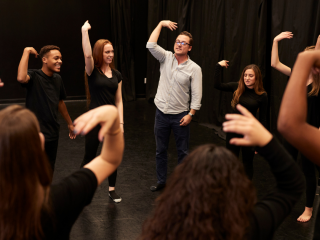We are in a brave new world of online learning. This is particularly challenging for theater, which is such a hands-on, participatory discipline. Our new modes of distance learning can’t take the place of being in the classroom, but there are ways to make online learning successful for students, teachers, and parents.
I’ve taught traditional, hybrid, and fully online courses for several years, and like so many other teachers, I’ve had to make the sudden shift to all online, all the time. For my writing and literature classes, this isn’t too difficult. But for my theater classes–it’s time to get creative. However, no matter the subject or teacher’s style, there are some basic tips to remember as you navigate distance learning.

Clear Objectives and Revised Activities
We utilize objectives in all of our lesson-planning. They are ingrained in us from our very first education courses. For successful online learning, communicate those objectives clearly at the beginning of each lesson. The objectives should answer two questions: What do you want students to know? What do you want students to be able to do?
The objective themselves can remain largely the same between traditional face-to-face learning and online instruction. However, the activities to achieve those objectives will probably need revision, especially if the activities relied on in-person collaboration between students, such as scene work and rehearsal. In that case, consider the objectives of the scene work: Rather than performance, students need to focus on scene analysis. They can investigate text-based questions about motivation, tension, pacing, and so on–without performing the piece.
A key to success in any lesson is organization and structure. Students appreciate having consistency, especially when everything else around them is in such turmoil. When I deliver lessons, no matter the format, students always know that I will present them with “Big Questions”–essential questions that we will answer throughout the lesson. Successful questions will be open-ended and promote skills. For example, a “Big Question” from my recent lesson on Theatre of the Absurd: “How does Samuel Beckett use techniques of absurdism in Waiting for Godot?” This gives us several objectives:
- Students will define absurdism and the techniques playwrights used.
- Students will read Waiting for Godot and apply their knowledge of absurdism and absurdist techniques.
The activities of the lesson will have a clear framework and process for how to achieve those objectives. Are there videos to watch, weblinks to follow, or worksheets to do? In the traditional classroom, we rely on ourselves to guide the students through the process. In this online format, the process must be written out, step-by-step. This gives students a checklist to ensure that they are completing the lesson.
Productive and purposeful lessons always have some sort of activity-based assessment. In this case, using Waiting for Godot as a model, I could have students write their own short absurdist scene. Not only can I see their understanding of the lesson, but I can encourage their creativity. In this case, Waiting for Godot is also very relevant to our current circumstances.
Mode of Delivery
How will you communicate with your students? There are multiple online platforms for lessons and communication: Google Classroom, Remind, Blackboard, Symbaloo, Class Dojo, and so many more. We can use video conferencing through tools like Zoom or Skype. Each school and school district likely has its own preferred method, and will provide appropriate resources to teachers. However, while there are many platforms, utilize just one or two. Keep it simple for students and their parents, and especially yourself!
All of these online methods depend on two things: access to the necessary technology, and the knowledge of that technology. And the reality is that not all students have computers or smartphones at home. There are many communities without reliable internet or WiFi. In that case, is it possible to have hard copies of materials distributed to students? How can you work with your administration or other teachers to ensure students have what they need? Theater is an elective course, and often those who teach theater are the only ones in their schools (if not districts) who do so. Check in with English or history teachers, and consider creating some cross-disciplinary activities or lessons.
Many schools are utilizing a combination of synchronous and asynchronous learning. For synchronous learning, everyone logs into an online platform at the same time. But for asynchronous, students work at their own pace. Even with an asynchronous schedule, consistent availability is vital. Set up virtual “office hours”–students know that you will always be online at that specific time. It can be formal, such as a Zoom meeting. But it can also be as simple as email–if a student emails you with a question, they know you will be able to reply immediately.

Manage Realistic Expectations
School at home will not be the same as a typical class day. The assigned workload for students will be less. Teachers should follow the recommendations and requirements of their school and district, but realistically, daily work isn’t necessary. Provide weekly lessons and objectives through the selected mode of delivery, and check-in with students throughout the week. Just sending out a quick email announcement is enough to remind students about their work, their learning, and that their teachers are still there.
As discussed earlier, not all students will have the same access to technology to facilitate their learning. Due dates for work are important and necessary. But flexibility with those due dates is equally vital. Follow the school’s policies regarding due dates and late work, but keep in mind that everyone is using online learning, and that level of volume can affect internet reliability and online platform maintenance.
We tend to think that the younger generations naturally understand how to use this technology, especially with the proliferation of social media. But that’s not always the case–and having a Twitter account is different than submitting work through Google classroom. Be patient, especially when the inevitable “how-to” questions come through.
Use Your Resources
Smart teachers never reinvent the wheel–we regularly borrow and adapt from our colleagues and online resources. StageAgent has a breadth of resources for teachers and students. Here are just a few examples:
31 Useful Theatre Things You Can Do on StageAgent from Home
Mexican-AmericanTheatre: Beyond Cinco de Mayo
First Steps to Tackling Shakespeare
No Strings Attached: Puppetry in Theater is Having a Moment
Who Wears the Pants? A brief look at cross-dressing in opera
Scene Study: A Practical Guide
Shakespeare’s History Plays: Unraveling the Kings
Several theaters have joined forces with streaming services to provide access to performances. A useful summary can be found here.
YouTube also has many free clips, previews, and interviews on theater that can be linked into lesson documents and activities.
A Final Note for Parents
This new distance learning world is an adjustment for everyone. Parents, it will be impossible to recreate your child’s school day at home. Don’t worry about a solid eight hours of school, because everyone will be burnt out and exhausted before the first day is done! Instead, help your student with organization: What is the work, and when is it due? Help them create a schedule so that they can complete their required tasks. And, as much as we remind our kids to get their homework done each night, we need to remind ourselves that the most important part of these changes is the health and safety of our families. The work will happen; enjoy your kids, as much as you can.














